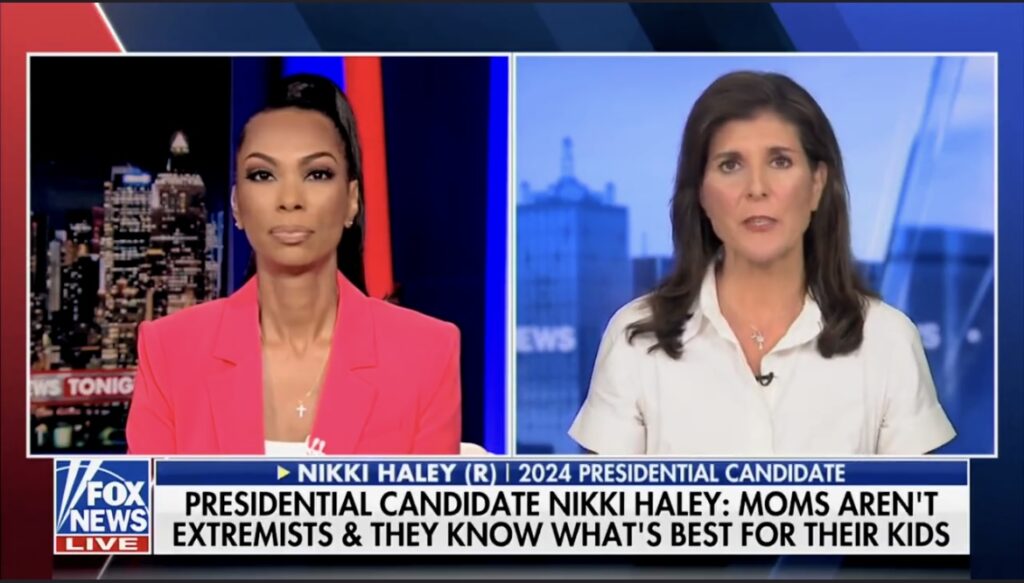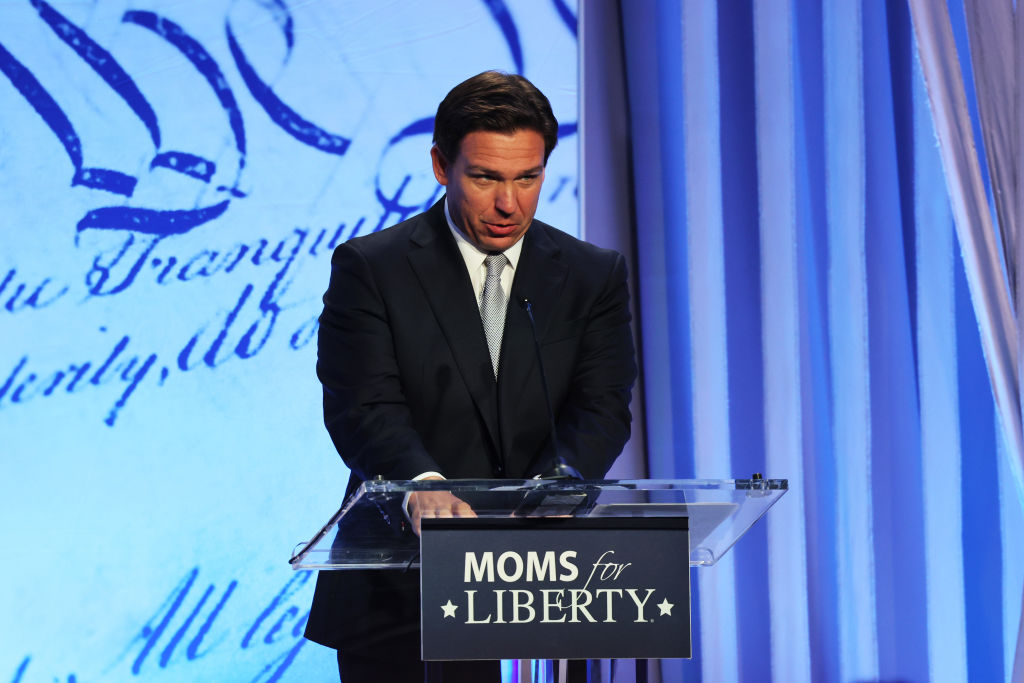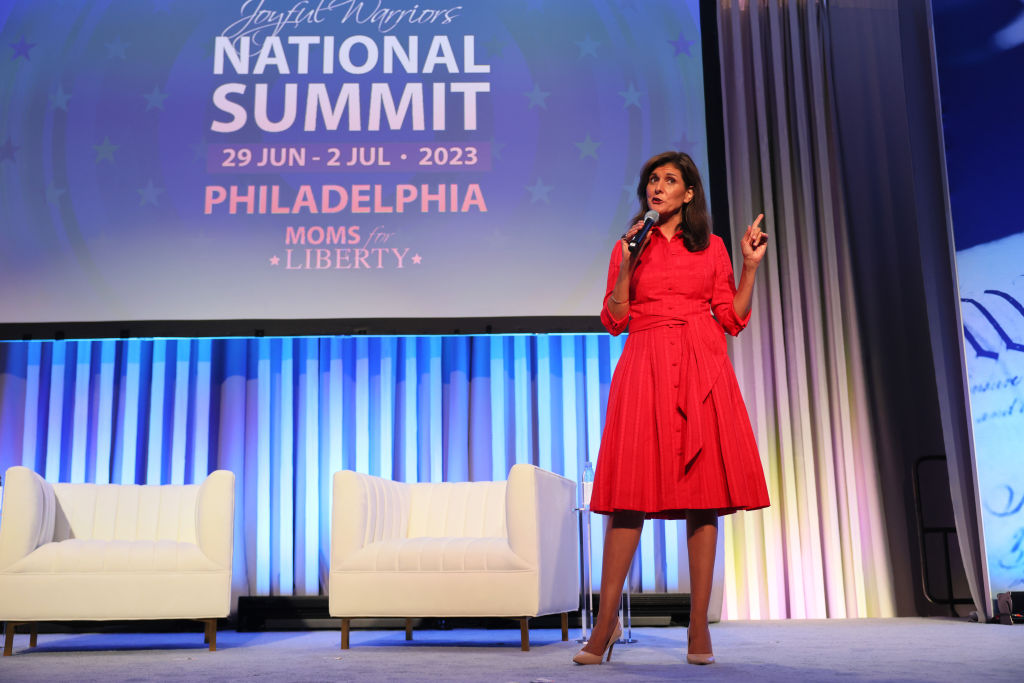Moms Can Do Anything…Even Shape an Election
By Dr. Gillian Frank
“MOMS AREN’T EXTREMISTS & THEY KNOW WHAT’S BEST FOR THEIR KIDS”
This headline appeared on Fox News’ chyron on June 7 beneath Nikki Haley, the former governor of South Carolina and current presidential candidate. It punctuated her defense (and praise) of the far-right group Moms for Liberty, an organization that the Southern Poverty Law Center recently classified as a hate group. But Haley isn’t the only one signing up to be a “joyful warrior”; conservative politicians are lining up to court the group’s endorsement, which, if gained, can go a long way to securing a victory in 2024.
Why are conservatives glomming onto a fringe group of so-called concerned parents? Over the past two-and-a-half years, Moms for Liberty has established branches across the United States and become a powerbroker in local and statewide elections. And the group’s ascent has been fueled, in part, because it has revitalized decades-old conservative rhetoric of “mother knows best,” “family values,” and “parental rights.” That language has helped MFL become the chosen vehicle for conservatives to express anti-Black, anti-LGBTQ, and anti-statist ideas and policies.
A little backstory: The founders of Moms for Liberty are three Floridian women with deep ties to the state’s Republican Party. They organized the group in 2021 to oppose masking requirements and other COVID remediation measures. Their slogan “We Do Not Co-Parent With the Government” quickly caught on in far-right circles, and MFL’s leaders became fixtures on right-wing media platforms, their organization swiftly growing across dozens of states.

After Florida’s governor prohibited vaccination and masking requirements in public schools in mid-2021, MFL no longer had their initial cause to cleave to and became a solution in search of a problem. The group remained focused on classrooms but trained its sights on long-standing conservative targets like textbooks, library books, and classroom curricula; anything that, in their words, promoted “woke indoctrination.” Right-wing media outlets with national audiences continued to showcase and validate these efforts, prompting local and national politicians to attend their fundraiser events and conservative donors to support them financially. Together right-wing media, politicians, and funders helped the group rapidly grow its membership, cultivate and endorse candidates, and spread its message even further.
The core of that message involves policing gender, racial, and sexual diversity, putting the group in lockstep with the priorities of the Republican Party. Trans youth hold an outsized place in MFL’s imagination. And in the name of “protecting” kids from trans folks and what they call “Gender Critical Theory,” they have successfully undertaken drives to fire teachers, censor books, and restrict what can be taught in the classroom.
But these maternalist campaigns are far from new. Since the 20th century, as historian Michelle Nickerson notes, conservative mothers have “put themselves forward as representatives of local interests who battled bureaucrats for the sake of family, community, and God.” Such conservative mothers’ groups, Nickerson explains, launched “local crusades” and often “successfully overpowered school administrators, boards of education, and teachers…by anointing themselves spokespeople…” Crack open the annals of conservative activism and you can find self-identified mothers battling sex education, school integration, communism, the ERA, and numerous other issues.

But, of course, MFL’s simultaneous opposition to “critical race theory” and “gender critical theory” has local roots in Florida. And the electoral vote-rich state, which has historically been the centerpiece of presidential campaigns, has in turn shaped national politics.
Since the 1950s, conservative opposition to LGBTQ rights in Florida has been intertwined with its opposition to African American rights. And the language used to oppose both the full inclusion of African Americans and LGBTQ folks was (and remains) protecting (white) children and (white) “parents’ rights.” In 1956, two years after the Supreme Court’s Brown v. Board of Education decision, and against the backdrop of massive resistance to integration, the Florida Legislative Investigative Committee, known as the Johns Committee, worked to neutralize African American civil rights organizations and the ongoing attempts to integrate Florida’s schools. When lawsuits stopped these racist pursuits, the committee shifted gears to investigate lesbian and gay teachers in Florida’s schools. Cheering on the Johns Committee’s efforts were White Citizens Councils and women’s groups like the Women’s Republican Club of St. Petersburg.
Using language that presaged MFL’s accusations of “grooming” and “indoctrination,” the Johns Committee argued that homosexual teachers were especially dangerous to schoolchildren because of a “desire to recruit them” and went even further by claiming “homosexuals are made by training rather than born.”

As the Johns Committee hounded civil rights leaders in the 1950s and terrorized teachers suspected of being gay or lesbian in the 1960s, reactionary Floridians continued to support statewide and local Citizens Councils. One of the first statewide efforts (which MFL members have since mirrored) was a 1957 attempt to purge progressive books from school libraries across the state, including a book containing the work of African American artists. In an effort to force the Florida Congress of Parents and Teachers to adopt a segregation resolution, Citizens Councils also targeted local PTAs with letter-writing campaigns, in which they alleged “a lot of teachers in the state are brainwashing the children and are teaching that white and Negro students should mix socially. A check should be made on all teachers through the state and anyone found guilty should be fired immediately.” Parents’ rights and white supremacy became interchangeable terms in the conservative lexicon, with the former becoming code for the latter.
History is not quite repeating itself, but it certainly is rhyming. There are numerous MFL-led or inspired efforts underway: In South Carolina, MFL school board members fired one district’s first Black superintendent and are seeking to ban books from libraries that teach “critical race theory.” In Tennessee, MFL members are seeking to remove children’s books about Martin Luther King Jr., Ruby Bridges, and Sylvia Mendez. In one Pennsylvania county, MFL-backed school board members have implemented policies that have, among other things, barred rainbow pride flags. With 275 MFL-endorsed candidates now holding office, the list goes on. In yoking together racial anxieties and sexualized fears, Moms for Liberty has taken the greatest hits out of the far-right playbook and reinvigorated them.
In the 1930s, James Waterman Wise famously warned that American fascism would be “wrapped up in the American flag and heralded as a plea for liberty and preservation of the constitution.” Wise was partially right. These anti-democratic impulses also come wrapped in images of family and as pleas to save “our” children. Indeed, MFL’s well-tested strategy of protecting “our” children from external dangers reinforces the notion that LGBTQ and African American youth are not “us,” and that they and their stories do not belong in “our” spaces. Even more pernicious, the language of maternalism and child protection seeks to obscure the anti-democratic political machinery at play—to make the work look homey and grassroots.
When presented with the image of a mother acting in the “best interest” of children, we are meant to not ask important questions like: Whose mother are you? Whose liberty do you stand for? Are all children being protected by your efforts? With the 2024 elections looming, these are some of the questions that we’ll need to keep asking over, and over, and over.